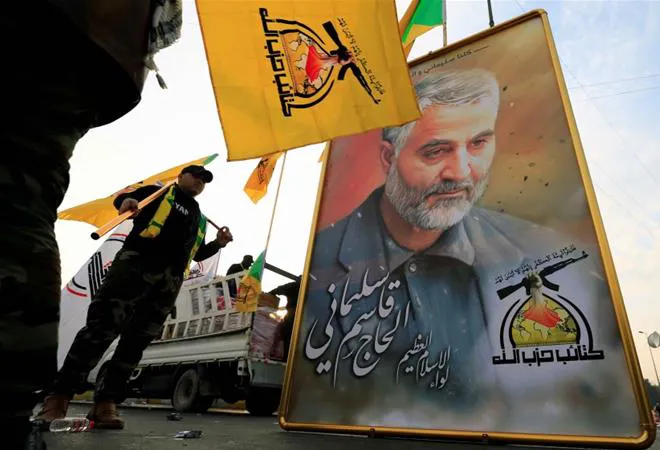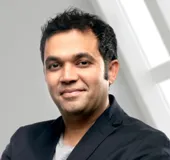
Imagine this. In a country, fresh out of revolution after deposing its king, with nationalistic fervour touching extreme levels, the call to duty spurs a 22-year-old into a newly formed armed force romanticised in Persian as the “'Army of Guardians of the Islamic Revolution', or the Islamic Revolutionary Guard Corps (IRGC). This idealist, barely out of his teens was previously working at a construction site to help repay his father’s agricultural debts. Some 20 years, and a string of wars and conflicts later, he’s heading the same force, transforming it into one of the most feared and effective organizations within and outside of its Persian homeland.
A symbol of Iran’s power in the neighbourhood, and a trusted associate of Iranian Supreme Leader Ayatollah Ali Khamenei, Gen. Qasem Soleimani’s
life was nothing short of a mythical poem, worthy of being eulogised in ‘Shahnameh’ (The book of kings), a 10th-century masterpiece by the Persian poet Ferdowsi.
In his two decades at the helm, Soleimani endeavoured to expand Iran’s clout in the Middle East and created or supported at-least four key regional players, who would have substantial implications in the fractious Middle East politics, and by extension, in the USA and Israel. These included the Hezbollah in Lebanon, Islamic Jihad movement (PIJ) in Palestine, the Popular Mobilisation Forces in Iraq, and the Houthis in Yemen.
A master of cartographic and ground based warfare, a recent example of Soleimani’s strategic brinkmanship was to re-wrest and re-establish the land corridor from Beirut to Tehran (
The Shia Crescent) in 2017, when the Syrian rebels had sealed off the Syria-Lebanon border, and the so-called Islamic State (IS) was controlling the Syria-Iraq border.
Despite his effectiveness in furthering the current Iranian regime’s ambitions when alive, ironically, it’s his death which would posthumously award him further. With the fulfilment of certain objectives that he would gladly see when alive. First, the unification of the disagreeable Shia factions from Iran to Iraq to Syria and Lebanon. Second, the reduction of the US presence in non-Kurdish part of Iraq to an insignificance.
The PMF (Popular Mobilisation Force), an umbrella group of Shia militia factions (also known as Hashd al-Shaabi which was created in 2014 to fight alongside Iraqi security forces against the IS), had seen fractious infighting amongst the Shia militias and suspicions peak in the last few years.
The PMF's factions divide into three main groups. The first is linked to the supreme religious authority in Najaf (Southern Iraq) represented by Grand Ayatollah Ali Al-Sistani; the second is associated with Iraqi cleric Muqtada Al-Sadr; while the last group, which represents the most numerous and best armed, is associated with Iran directly. The first two factions (Iraq allegiance) haven’t seen eye to eye with the Iranian faction for a while, given a growing apathy to interference from Iranian forces in Iraq.
Following the assassinations of Soleimani and Al-Muhandis (the de facto leader of the PMF), Hezbollah leader Hassan Nasrallah was
tasked by Iran to quell tensions between the groups and create a “united resistance” to US troops in Iraq. This seems to have worked, with the various factions having agreed to put their differences aside and back Hadi al-Amiri as the new chairman of the Popular Mobilisation Forces (PMF). Unity in the PMF is bad news for the non-Shia neighbourhood within and outside of Iraq. The first signs of this were evident in the Iraqi Parliament vote against US presence in Iraq.
At the request of the Iraqi caretaker prime minister, Abdul-Mahdi, the Iraqi parliament met on 5 January to vote on the presence of US troops on Iraqi soil. The vote was almost boycotted by the Kurdish and the Sunni parties, and the overwhelming attendees to the session were the Shia parties, even those opposed to one another. The Parliament dominated by Shia voices then voted overwhelmingly for US withdrawal from Iraq, even while Sunni & Kurdish leaders decried the decision as unilateral.
The vote in parliament put the Kurdish Regional Government in an awkward position, and by boycotting the parliamentary session, Kurdish leaders signalled their reservations. While the Iraqi Prime Minister might not have the executive mandate to implement the decision (he’s a caretaker Prime Minister with limited executive powers), there is no doubt that the US will substantially reduce presence in Iraq with it being an election year in the US and Trump needs to do good on the optics of his poll promise. This might be balanced with increasing US presence and boots in the Kurdish North of Iraq, which might just be the farthest they can be, to check Iran’s advance in the country.
The Kurds, unfortunately, abandoned by the US in Syria before the Turkish onslaught, have little choice in this region of shifting fortunes. Fatigued from their bloody war with the IS, and now battling the Turkish onslaught on their Syrian borders, might have little choice but to welcome increased US presence in their region, yet again.
While the possibility of an escalatory cycle toward a wider military conflict between the US and Iran stays remote, Iraq will continue to be the theatre of collateral damage. While Soleimani’s killing might serve Trump well politically, ironically, he just gave Soleimani the kind of posthumous victory that was previously denied him when alive.
The views expressed above belong to the author(s). ORF research and analyses now available on Telegram! Click here to access our curated content — blogs, longforms and interviews.



 Imagine this. In a country, fresh out of revolution after deposing its king, with nationalistic fervour touching extreme levels, the call to duty spurs a 22-year-old into a newly formed armed force romanticised in Persian as the “'Army of Guardians of the Islamic Revolution', or the Islamic Revolutionary Guard Corps (IRGC). This idealist, barely out of his teens was previously working at a construction site to help repay his father’s agricultural debts. Some 20 years, and a string of wars and conflicts later, he’s heading the same force, transforming it into one of the most feared and effective organizations within and outside of its Persian homeland.
A symbol of Iran’s power in the neighbourhood, and a trusted associate of Iranian Supreme Leader Ayatollah Ali Khamenei, Gen. Qasem Soleimani’s
Imagine this. In a country, fresh out of revolution after deposing its king, with nationalistic fervour touching extreme levels, the call to duty spurs a 22-year-old into a newly formed armed force romanticised in Persian as the “'Army of Guardians of the Islamic Revolution', or the Islamic Revolutionary Guard Corps (IRGC). This idealist, barely out of his teens was previously working at a construction site to help repay his father’s agricultural debts. Some 20 years, and a string of wars and conflicts later, he’s heading the same force, transforming it into one of the most feared and effective organizations within and outside of its Persian homeland.
A symbol of Iran’s power in the neighbourhood, and a trusted associate of Iranian Supreme Leader Ayatollah Ali Khamenei, Gen. Qasem Soleimani’s  PREV
PREV


